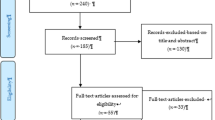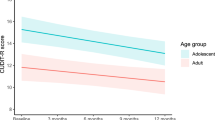Abstract
Despite the high prevalence of substance use disorders (SUDs) in the U.S., many with a SUD go untreated and/or report lengthy delays to help-seeking initiation. From a public health standpoint, because SUDs often emerge in early adulthood, information on help-seeking behaviors among young adults is important. Using data from young adults ages 18–23 years with a history of a SUD (n = 672) in Miami-Dade County, Florida, this study estimates the prevalence of lifetime help-seeking initiation and examines factors related to help seeking and delays to help-seeking initiation. The majority (68%) of young adults with a history of a SUD reported never having sought help, and those who reported help seeking experienced relatively lengthy delays (1–7 years) to help-seeking initiation. These findings underscore the need for both timely substance abuse treatment and for accelerated research on successful outreach strategies for young adults with SUDs.
Similar content being viewed by others
References
Kessler RC, McGonagle KA, Zhao S, et al. Lifetime and 12-month prevalence of DSM-III-R psychiatric disorders in the United States: Results from the national comorbidity survey. Archives of General Psychiatry. 1994;51:8–19.
Kessler RC, Chiu WT, Demler O, et al. Prevalence, severity, and comorbidity of 12-Month DSM-IV disorders in the national comorbidity survey replication. Archives of General Psychiatry. 2005;62:617–627.
Grant BF, Dawson DA, Stinson FS, et al. The 12-month prevalence and trends in DSM-IV alcohol abuse and dependence: United States, 1991–1992 and 2001–2002. Drug and Alcohol Dependence. 2004;74:223–234.
Department of Health and Human Resources. Results of the National Survey of Drug Use and Health. Substance Abuse and Mental Health Services Administration. Rockville, MD, 2007
Harwood, H. Updating Estimates of the Economic Costs of Alcohol Abuse in the United States: Estimates, Update Methods, and Data. Report prepared by The Lewin Group for the National Institute on Alcohol Abuse and Alcoholism, 2000. Based on estimates, analyses, and data reported in Harwood, H.; Fountain, D.; and Livermore, G. The Economic Costs of Alcohol and Drug Abuse in the United States 1992. Report prepared for the National Institute on Drug Abuse and the National Institute on Alcohol Abuse and Alcoholism, National Institutes of Health, Department of Health and Human Services. NIH Publication No. 98–4327. Rockville, MD: National Institutes of Health, 1998.
Substance Abuse and Mental Health Services Administration. Results from the 2002 National Survey on Drug Use and Health: National Findings (Office of Applied Studies, NHSDA Series H-22, DHHS Publication No. SMA 03–3836). Rockville, MD, 2003.
Wu, Li-Tzy, Daniel J. Pilowsky, William E. Schlenger, and Deborah Hasin. Alcohol Use Disorders and the Use of Treatment Services among College-Age Young Adults. Psychiatric Services. 2007;58(2):192–200.
Rosenberg, Linda. Building a meaningful future for young people with mental illness. The Journal of Behavioral Health Services and Research. 2008;35(4):362–364.
Bland, R. C., S. C. Newman, and H. Orn. Lifetime Prevalence of Psychiatric Disorders in Edmonton. Acta Psychiatry Scandinavia. 1988;77:24–32.
Giaconia, Rose M., Helen Z. Reinherz, Amy B. Silverman, Bilge Pakiz, Abbie K. Frost, and Elaine Cohen. Ages of Onset of Psychiatric Disorders in a Community Population of Older Adolescents. Journal of American Academy of Child Adolescent Psychiatry. 1994;33(5):706–17.
Warner LA, Canino G, Colon HM. Prevalence and correlates of substance use disorders among older adolescents in Puerto Rico and the United States: a cross-cultural comparison. Drug and Alcohol Dependence. 2001;63:229–243.
Warner LA, Kessler RC, Hughes M, et al. Prevalence and correlates of drug use and dependence in the United States: Results from the national comorbidity survey. Archives of General Psychiatry. 1995;52:219–229.
Turner RJ, Gil A. Psychiatric and substance disorders in South Florida: Racial/ethnic and gender contrasts in a young adult cohort. Archives of General Psychiatry. 2002;59:43–50.
Kessler, Ronald C., and Philip S. Wang. The Descriptive Epidemiology of Commonly Occurring Mental Disorders in the United States. Annual Review of Public Health. 2008;29:115–29
Kessler, Ronald C., G. Paul Amminger, Sergio Aguilar-Gaxiola, Jordi Alonso, Sing Lee and T. Bedirhan Üstün. Age of onset of mental disorders: a review of recent literature. Current Opinion in Psychiatry. 2007;20:359–364
Pottick KJ, Bilder S, Stoep AV, et al. US patterns of mental health service utilization for transition-age youth and young adults. The Journal of Behavioral Health Services Research. 2008;35(4):373–389.
Cohen E, Feinn R, Arias A, et al. Alcohol treatment utilization: Findings from the national epidemiologic survey on alcohol and related conditions. Drug and Alcohol Dependence. 2007;86:214–221.
Kessler RC, Aguilar-Gaxiola S, Berglund PA, et al. Patterns and predictors of treatment seeking after onset of a substance use disorder. Archives of General Psychiatry. 2001;58:1065–1071.
Wang PS, Berglund P, Olfson M, et al. Failure and delay in initial treatment contact after first onset of mental disorders in the National Comorbidity Survey Replication. Archives of General Psychiatry. 2005;62:603–613.
Kessler RC, Olfson M, Berglund PA. Patterns and predictors of treatment contact after first onset of psychiatric disorders. American Journal of Psychiatry. 1998;155:62–69.
Wang PS, Berglund PA, Olfson M, et al. Delays in initial treatment contact after first onset of a mental disorder. Health Services Research. 2004;39:393–415.
Wu L-T, Ringwalt CL. Use of alcohol treatment and mental health services among adolescents with alcohol use disorders. Psychiatric Services. 2006;57(1):84–92.
Flynn PM, Brown BS. Co-occurring disorders in substance abuse treatment Issues and prospects. Journal of Substance Abuse Treatment. 2008;34(1):36–47.
Garland AF, Aarons GA, Brown SA, et al. Diagnostic profiles associated with use of mental health and substance abuse services among high-risk youths. Psychiatric Services. 2003;54:562–564.
Wu LT, Kouzis AC, Leaf PJ. Influence of comorbid alcohol and psychiatric disorders on utilization of mental health services in the national comorbidity survey. American Journal of Psychiatry. 1999;156:1230–1236.
Harris KM, Edlund MJ. Use of mental health care and substance abuse treatment among adults with co-occurring disorders. Psychiatric Services. 2005;56:954–959.
Vega WA, Gil AG. Drug use and ethnicity in early adolescence. New York, NY: Plenum Press, 1998.
Hollingshead AB. Two Factor Index of Social Position. New Haven, CT: Hollingshead AB, 1957.
American Psychological Association (APA). Diagnostic and statistical manual of mental disorders (DSM-IV), 4th ed. Washington, DC: American Psychological Association, 1994
Blazer DG, Kessler RC, McGonagle KA, et al. The prevalence and distribution of major depression in a national community sample: The national comorbidity survey. American Journal of Psychiatry. 1994;151(7):979–986.
Nelson CB, Little RJA, Heath AC, et al. Patterns of DSM-II-R alcohol dependence symptom progression in a general population survey. Psychological Medicine. 1996;26(3):449–460.
Wittchen H-U, Robins LN, Cottler LB, et al. Cross-cultural feasibility, reliability and sources of variance in the composite international diagnostic review (CIDI). British Journal of Psychiatry. 1991;159:645–653.
Wittchen H-U, Kessler RC, Zhao S, et al. Reliability and clinical validity of UM-CIDI DSM-III-R generalized anxiety disorder. Journal of Psychiatric Research. 1995;29(2):95–110.
Wittchen H-U, Zhao S, Abelson JM, et al. Reliability and procedural validity of UM-CIDI DSM-III-R phobic disorders. Psychological Medicine. 1996;26:1169–1177.
Prusoff BA, Merikangas KR, Weissman MM. Lifetime prevalence and age of onset of psychiatric disorders: recall 4 years later. Journal of Psychiatric Research. 1988;22:107–117.
Farrer LA, Florio LP, Bruce ML, et al. Reliability of self-reported age at onset of major depression. Journal of Psychiatric Research. 1989;23:35–47.
Freedman D, Thornton A, Camburn D, et al. The life history calendar: A technique for collecting retrospective data. In: Clogg CC (ed). Sociological Methodology. Ann Arbor, MI: Institute for Social Research, University of Michigan, 1988, pp. 37–68.
Cox DR. Regression models and life tables. Journal of the Royal Statistical Society. 1972;B34:187–220.
Allison PD. Survival Analysis Using SAS: A Practical Guide. Cary, NC: SAS Publishing, 2003.
DeWit DJ, Adlaf EM, Offord DR, et al. Age at first alcohol use: A risk factor for the development of alcohol disorders. American Journal of Psychiatry. 2000;157:745–750.
Kosterman RJ, Hawkins D, Guo J, et al. The dynamics of alcohol and marijuana initiation: Patterns and predictors of first use in adolescence. American Journal of Public Health. 2000;90:360–366.
Gruber E, DiClemente RJ, Anderson MM, et al. Early drinking onset and its association with alcohol use and problem behavior in late adolescence. Preventive Medicine. 1996;25:293–300.
Guo J, Collins LM, Hill KG, et al. Developmental pathways to alcohol abuse and dependence in young adulthood. Journal of Studies on Alcohol. 2000;61:799–808.
Windle M, Mun EY, Windle RC. Adolescent-to-young adulthood heavy drinking trajectories and their prospective predictors. Journal of Studies on Alcohol. 2005;66:313–322.
Gamble VN. Under the shadow of Tuskegee: African Americans and health care. American Journal of Public Health. 1997;87(11):1773–1778.
Padgett DK, Patrick C, Burns BJ, et al. Ethnicity and use of outpatient mental health services in a national insured population. American Journal of Public Health. 1994;84(2):222–226.
Schmidt L, Greenfield T, Mulia N. Unequal treatment: Racial and ethnic disparities in alcoholism treatment services. Alcohol Research & Health. 2006;29(1):49–54.
Eiser AR, Ellis G. Cultural competence and the African American experience with health care: The case for specific content in cross-cultural education. Academic Medicine. 2007;82(2):176–183.
Acknowledgments
This study was supported by grant RO1 DA10772 to R. Jay Turner from the National Institute on Drug Abuse, Bethesda, MD.
Author information
Authors and Affiliations
Corresponding author
Rights and permissions
About this article
Cite this article
Gayman, M.D., Cuddeback, G.S. & Morrissey, J.P. Help-Seeking Behaviors in a Community Sample of Young Adults with Substance Use Disorders. J Behav Health Serv Res 38, 464–477 (2011). https://doi.org/10.1007/s11414-011-9243-1
Published:
Issue Date:
DOI: https://doi.org/10.1007/s11414-011-9243-1




